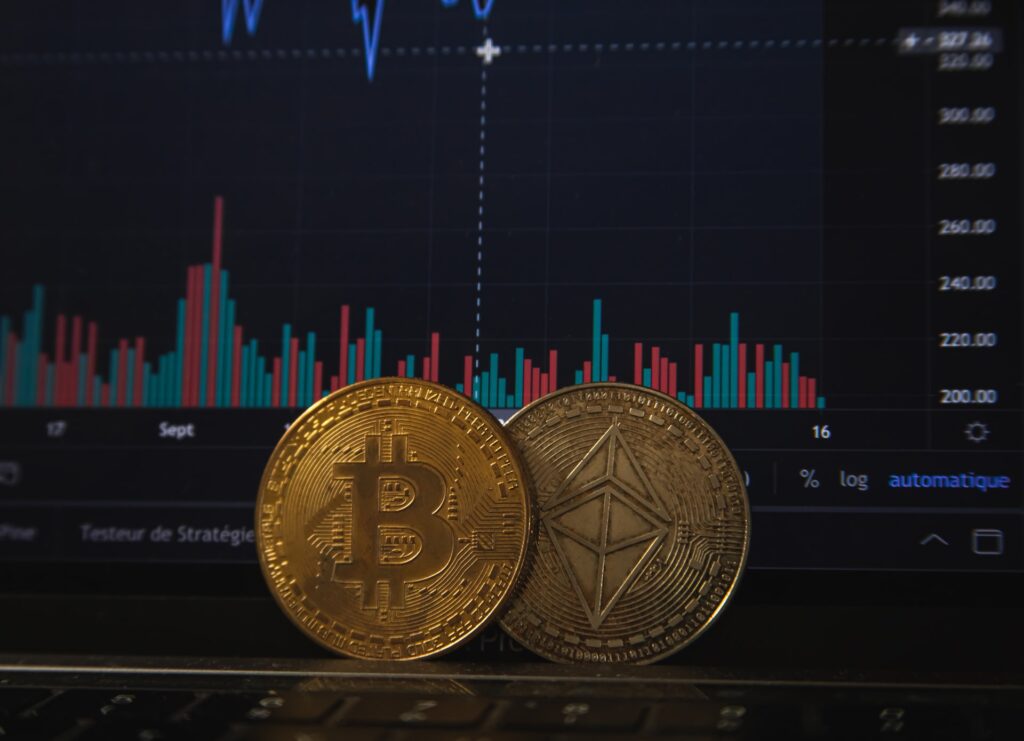 Analyst at King’s Global Markets
Analyst at King’s Global Markets
It is a commonly known fact that Bitcoin is the largest cryptocurrency in circulation on the market, far exceeding the second place – Ethereum, with a market capitalisation of over $600 billion USD. What exactly has been happening? The recent week has marked one of the largest dips in Bitcoin’s history, since its creation in 2009. Bitcoin’s YTD price peaked at over $60,000 USD on April 14th and has gently declined since then, with the current price marking in the $35,000 USD region.
The cryptocurrency market in general has also been experiencing a contraction. Within a matter of a week, the crypto market has lost nearly $1.29 trillion USD which is a staggering drop from $3.23 trillion USD the previous week. Clearly, this came after Bitcoin, which accounts for nearly 40% of the crypto market, took a sizable nosedive of over -30%, reaching its lowest point since January.
The future of cryptocurrencies seems relatively unaffected for now. However, the short-term prospects for crypto do not seem very promising. This has led to a wave of sell-off, especially amongst retail investors, which in the recent years, have proven to be a force to be reckoned with, within markets. To possibly predict what would happen next for Bitcoin, it is important to obtain a more holistic understanding of the recent events and see what to expect for the world’s most successful cryptocurrency.
What are the possible causes?
Obviously, with anything relating to markets, there is no clear definitive cause of market fluctuations or sudden movements and changes. However, there are events that clearly are indicative of sizable shifts in the market recently, and thus we could logically draw causal inference between the two. I have managed to nail down two primary driving forces of the recent changes, being Elon Musk’s tweets and China’s announcement of regulatory changes
- Elon Musk
On 13th May, Tesla CEO Elon Musk posted on his twitter account that Tesla has suspended vehicle purchases utilising Bitcoin. He stated that the decision was based on the “rapidly increasing use of fossil fuels for Bitcoin mining and transactions, especially coal, which has the worst emissions of any fuel.” He then goes on to assert that cryptocurrency is a good idea and has a “promising future”, however, he does not believe that the use of cryptocurrencies should compromise the goals of conserving our environment.
The price of Bitcoin instantly tumbled from nearly $50,000 USD on 13th May down to the lower regions of $35,000 USD within a week.
Tesla initially sparked a Bitcoin boom in February. This came after their announcement of a $1.5 billion USD investment into the cryptocurrency to enable their customers to purchase vehicles utilising Bitcoin.
However, this does beg the question: “How exactly is Bitcoin harmful to our environment?”. Essentially, the “climate impact” that Elon Musk was referring to, in regards to Bitcoin, is the high level of energy consumption caused by Bitcoin mining. Bitcoin is mined by solving complicated cryptographic puzzles, the complexity of these puzzles increase as more Bitcoins are mined. The computational energy required for solving these cryptographic puzzles is immense. In 2019, a joint research conducted by Technische Universität München and Massachusetts Institute of Technology showed that the total emission of CO2 of the Bitcoin network amounted to 22.9 million tonnes in 2018. This is equivalent to the emission level of a large city in an economically developed country.
Considering Tesla is one of the predominant pioneers of the electric vehicles (EVs) market, it would be seen as counterproductive for them as a corporate entity to support Bitcoin, knowing its immense impact upon the environment.
In my opinion, the timing seems too convenient for Elon Musk. I fail to believe that Mr. Musk only realised the seemingly catastrophic effects of Bitcoin mining now, considering that it has been raised as an issue within the media for a few years now. Nonetheless, my opinion would only be considered speculation at this point. Furthermore, Elon Musk has also established somewhat of a reputation for himself. He is notorious for moving the prices of cryptocurrencies with his tweets, so this instance could also be related to that.
- China
The price of Bitcoin plummeted on 12th May after the People’s Bank of China (PBOC) imposed a ban on banks and financial services firms from providing services related to cryptocurrency transactions.
China is one of the countries with the highest number of Bitcoin miners. As mentioned earlier, Bitcoin mining involves a high level of energy consumption, thus the central government saw this afoul of China’s efforts to curb their greenhouse gas emissions. Furthermore, Bobby Lee, the founder and CEO of cryptocurrency storage provider Ballet said that “the new guidance issued from the regulatory agencies – they’re taking it more seriously, they want more enforcement”. Lee also mentioned that there are discussions going on about going after Bitcoin miners.
To provide reasoning has never been a prerequisite to PBOC policy making. However, they did provide several reasons for this decision. The PBOC has said that the volatile nature of cryptocurrencies has led to unprecedented levels of speculative trading. The bank saw this as a source of harm towards the country’s financial systems and thus imposed a ban upon it. Another reason is that most cryptocurrencies pride themselves on their decentralised nature. This means that the use of crypto would guarantee anonymity. The PBOC argued that this would encourage or create a financial landscape that enables financial crimes to thrive.
Personally, I have a different understanding and view towards their decision. I see this as the perfect opportunity for this strategic move but not for the reasons cited above. Earlier in March this year, Mu Changchun, the director of the PBOC’s Digital Currency Research Institute, announced further news on China’s pilot project – the digital yuan (e-CNY). The e-CNY is China’s central bank digital currency (CBDC) which is China’s way to fully digitalise its economy. Ma clarified in March that the e-CNY would allow the achievement of “controllable anonymity”. Therefore, I see this ban as China’s way of eliminating any source of competition within the domestic market, paving the way for an “uneven playing field” and a smoother implementation for the e-CNY in the future.
What do experts say about the true value of Bitcoin?
Most crypto experts deemed this phenomenon as “normal” and a healthy correction within the market. Chief Strategy Officer of London-based digital asset investment strategists CoinShares, Meltem Demirors said that this is regular behaviour of crypto markets. Investment Strategist Luke Lloyd has also stated that these corrections play a vital part in crypto markets as they are speculative assets by nature and rely highly on the forces of supply and demand. The general trend is that retail investors inject money into the system and it will be pushed up by rapidly rising demand and they will eventually “take profits and cash out to go somewhere else” which leads to a wave of sell-off.
A more comforting note is the fact that previous dips are even larger in magnitude. However, a large number of cryptos are backed by institutions which lowers volatility for assets within this class. Not to mention, the current price is still 4 times higher than that of the price in September 2020, which was around $10,000 USD.
What should we expect next?
First of all, it is important to discuss the implications of China’s crackdown on cryptocurrencies. Thomas Heller, the co-founder, and CBO at Compass Mining has noted that anti-bitcoin mining sentiment is always present and regularly comes up in the news. However, this instance is different, and a lot of Chinese miners are quite worried and uncertain of the impact right now.
Secondly, the recent swing in prices have worried larger institutional investors and would potentially lead to huge liquidations by leveraged investors. This would harm the narrative that cryptocurrencies are on their paths to becoming more stable as they mature.
From the previous point, I reach the final point which is regulatory risk. Elon Musk’s tweets have reignited regulatory bodies’ desire to impose restrictions or regulations on cryptocurrencies. Musk’s tweets have given the perfect opportunity for authorities to flag trading volatility as a source of concern to scrutinise cryptocurrencies. CEO of Infrastructure Capital Advisors, Jay Hatfield has described the possible imposition of transaction reporting requirements, which would completely defy the point of anonymity, as the “tip of the iceberg”. He has also expressed the concern that retail investors underestimate the impact of regulatory changes, as governments would do everything they can to “defend their lucrative monopolies over currency”.
In my opinion, government regulations would mainly hurt smaller cryptocurrencies (with smaller market capitalisation). Larger cryptocurrencies, like Ethereum and Bitcoin, would be difficult to regulate unless they illegalies transactions and impose a complete ban. Furthermore, I see a more bullish future for Bitcoin and other large cryptos. This is because the more talk and worries on regulations and government scrutiny signifies the success of cryptocurrencies and bestows legitimacy upon them.
Exclusive Offer: Get £100 off your Summer Internship Experience at Amplify Trading by clicking here or using our unique discount code at the checkout: MSAmplifySummer2021. Participants graduate from the course with a Diploma from the London Institute of Banking & Finance. For more information about the course, click here.
Further reading
https://www.dw.com/en/tesla-changes-stance-on-bitcoin-amid-climate-concerns/a-57515879
https://www.dw.com/en/bitcoin-cryptocurrencies-plunge-after-china-issues-restrictions/a-57586845
https://www.coindesk.com/bitcoin-slips-37k-china-vicecrackdown-mining

King's Global Markets - KGM
King’s Global Markets is a community of students dedicated to the advanced study and application of global financial markets, economics and global business.